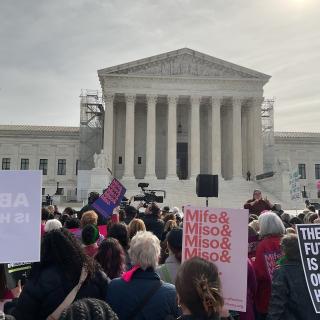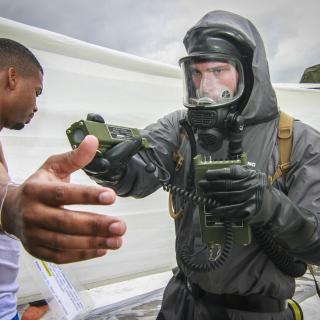Advertisement
Thousands of labor movement activists gathered together at the 2018 Labor Notesconference in Chicago on April 6-8. We were excited to be able to join them, representing CWA Local 4502. The conference gave us many ideas to bring back to our union and community, as we enter into "the best of times, the worst of times" for the labor and other social movements.
From the Bottom Up
The labor movement in the United States faces the worst of times as the Supreme Court is poised to rule on Janus v. AFSCME, potentially dealing a heavy blow to the ability of public-sector unions, the strongest bastion of organized US labor, to collect fair share fees for the purpose of fighting for the interest of all in our bargaining units, not just union members.
And yet we may also be at the beginning of the best of times. Witness the surge of teachers' strikes, from West Virginia to Oklahoma, Colorado to Arizona. Activist teachers from West Virginia, who organized a massive statewide strike and won a 5% pay raise while reopening the health care issue, received a hero's welcome at the Labor Notes conference. There is nothing like victory to inspire more struggles for more victories.
The victory in West Virginia would not have been possible, though, if the teachers had waited to get "mobilized" by an order from above. They won because they discussed problems – especially the soaring health insurance premium – among themselves, shared their grievances with one another, came up with and organized their own campaign from the bottom up, and did not give up even when they were told to get back to work by state-level labor officials as well as legislators, effectively turning the strike into a wildcat.
As one of the West Virginia teachers said at the conference, quoting a slogan from the public-sector strike wave in the sixties and seventies: "There is no illegal strike, only an unsuccessful one."
Turning Anger into Activism, Reclaiming Dignity and Humanity
What moves workers to take action? What do we gain when we do? The answers to these questions cannot be summarized in dollars and cents of paychecks and insurance premiums alone, however. What's at stake is dignity. When our dignity is threatened, we are compelled to act, and by acting in our own interest we regain our dignity. That was one of the recurring themes of the conference.
The West Virginia teachers told us that the last straw for them was not only the outrageous premium hike but also the way the insurance plan management intruded into their privacy and infringed on their freedom, by making the teachers report their weights and even sexual activities. A metro kiosk vender turned labor activist from Japan barely choked back tears while telling us about how experiencing the glaring gap between regular workers and contract workers like her built up explosive anger inside her that dehumanized her; the process of beginning to organize a union with her fellow contract venders and collectively fighting for their rights, she said, made her human again.
Putting the "Social" Back into Social Movements
Again and again activists we met at the conference emphasized the importance of sharing thoughts and feelings, especially in informal social gatherings, anywhere from virtual spaces like Facebook to potluck parties among friends. We often hear of the need to put "movement" back into the labor movement. What may have to come before that, though, is to put the "social" back into social movements.
International Solidarity
The conference was a great assembly of dedicated labor activists from not only the US but also 24 other countries. We applaud Labor Notes for choosing to honor the Korean Confederation of Trade Unions as a recipient of the Troublemaker Award this year. Activists in the US have much to learn from the KCTU's role in the "candlelight uprising" that ousted Park Geun-hye and ushered in the left-of-center Moon Jae-lingovernment, which the KCTU hopes to push further to the left while challenging its limitations.
The opportunity to learn would have been greater, however, if a broader spectrum of labor activists outside the US had been able to attend it. The absence of delegates from the Unified Workers' Central (CUT) and the Landless Workers' Movement (MST), for instance, impoverished a panel on international solidarity where Brazil was under discussion, since we were able to hear only from a delegate from CSP-Conlutas, whose perspective on the Workers' Party (PT) differs from those of the CUT and the MST.
Free Press
You would never find out, though, about the Labor Notes conference, what it does best, what it can do better, by reading the capitalist press. There is always a business section in a capitalist newspaper, never a labor section. For that we need to turn to the Free Press and other media of our own. Only by building our own media can we hope to create a genuine public forum where what really matters to us can be freely discussed.



